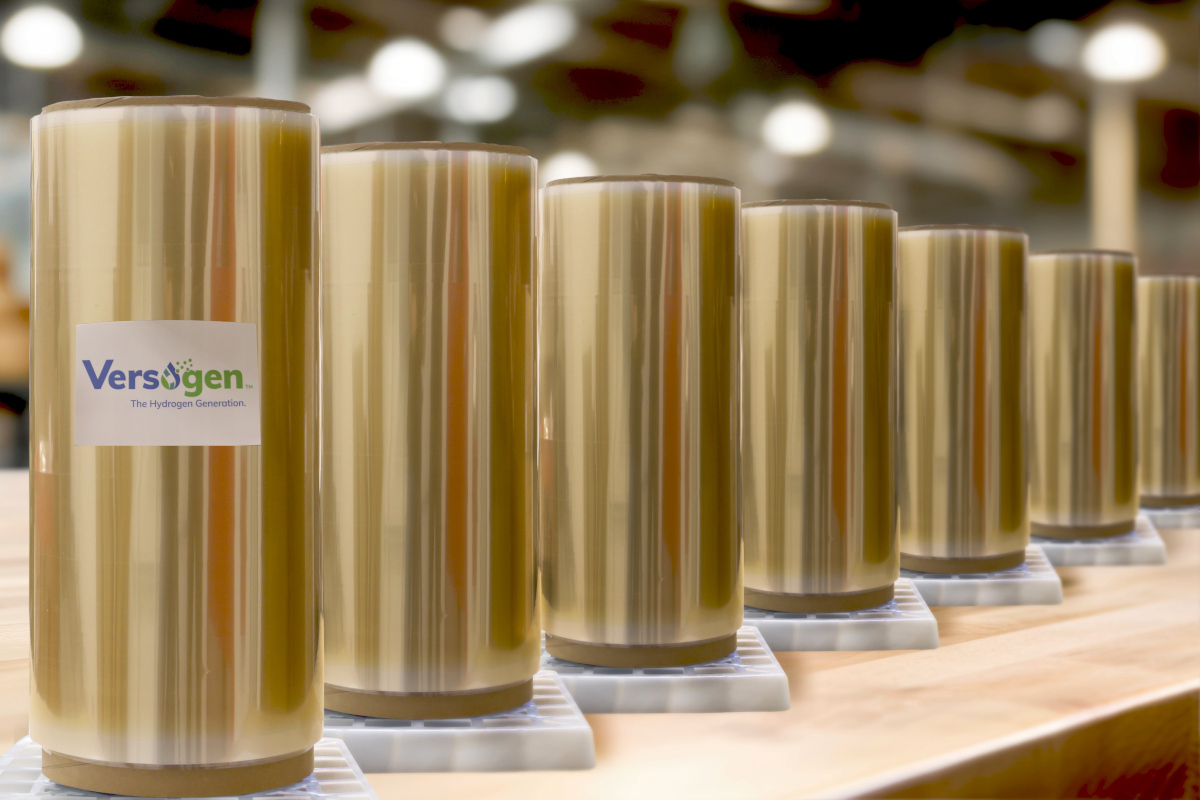-
 play_arrow
play_arrow
Radio Rehoboth

A couple of years ago, Dora Cheatham and some of her colleagues kept having this running conversation. “We would discuss how we needed more heavy water for various uses in Delaware,” she says. “In general, it’s hard to get hold of heavy water in the U.S. Since heavy water is a byproduct of electrolysis, that led us to discuss the production of hydrogen — clean hydrogen. So we started looking at doing that.”
It is still early spring when Cheatham, a board member and former leader of the Delaware Sustainable Chemistry Alliance, is telling her story, but she emphasizes she is not yet at liberty to reveal who all the “we” people are — except that they are founders of a new company, First State Hydrogen. “I’m the company’s first employee,” Cheatham says with a laugh. The new company is being headed by Andrew Cottone, who was previously in charge of an award-winning energy program at Adesis while CEO of that company.
Although the structure of First State Hydrogen was still under wraps at the time of the interview, its goal was clear— to build a facility in northern Delaware that would both generate clean energy and be utilized to manufacture clean hydrogen, and do so by 2026 — less than two years away.
By the time you read this, the site of that plant should already be announced; such is the rapid pace of developments in this important field.
MACH2 Coalition to Result in Major Funding Influx
The quest for clean hydrogen in Delaware is not limited to First State Hydrogen. Indeed, the national quest for production of hydrogen from clean energy sources is an important facet of the fight against global warming, and that quest has recently become like a breath of fresh air in Delaware — a breath that is quickly accelerating to becoming a brisk breeze.
Central to this excitement was the announcement last fall that a Delaware-southeastern Pennsylvania-southern New Jersey region coalition was one of seven areas chosen nationally from 80 proposals received by the Department of Energy. As a result, the coalition will receive $750 million in funding for the creation of a clean hydrogen hub — a network of hydrogen producers, consumers and local connective infrastructure. This hub is known by the acronym “MACH2” — the Mid-Atlantic Clean Hydrogen Hub.
In putting together the MACH2 hub, “We reached out to people who already had functioning hydrogen projects or production as well as those who have the potential for high hydrogen demand, with the idea of linking the two,” says Collin O’Mara, MACH2 chairman and a former Delaware official who is also currently running to become Delaware’s Governor. Educational institutions and labor organization shave also been recruited as parts of the hub.
While hydrogen is seen as the ideal fuel of the future, with only water as an emission, producing it is currently expensive and generally requires polluting, carbon-based fuels. “Today, 98 to 99% of hydrogen production is from natural gas,” O’Mara says. “Switching from gray fuel sources to green ones doesn’t require a lot, but the emission reduction from doing so would be massive.”
Collectively, the goal of the combined hubs is to annually reduce 25 million metric tons of carbon dioxide emissions from end uses —roughly the combined equivalent of the annual emissions of 5.5 million gasoline-powered cars. The hubs are also expected to create tens of thousands of jobs across the country while supporting healthier communities and strengthening America’s energy security.
One of the attractions of locating a hydrogen hub in the Delaware River region, O’Mara says, is that existing and former refineries along the river and bay can be replaced with green hydrogen facilities. “Additionally, if hydrogen is produced locally, it won’t have to be transported in,” O’Mara says, noting that transportation would be a costlier and energy-consuming process.
That’s where Cheatham and First State Hydrogen, one of roughly two dozen private and public entities that are part of MACH2’s original umbrella, come into play. “Our plan is to build a 60-megawatt facility in Delaware that is powered by 100% renewable energy,” Cheatham says, and it will be a single facility that will both generate power and produce hydrogen.
The site had not yet been chosen at the time of writing, but Cheatham says ideally it will be somewhere along an existing 24-mile pipeline that runs from New Castle to the southwestern suburbs of Pennsylvania. The private pipeline is regulated by the Department of Transportation for the transport of refined products and currently services refineries and other energy-related facilities. The current pipeline would either be re-formulated or re-laid to accommodate the flow of clean hydrogen. Engineering studies are already underway, Cheatham says, and she indicates the company has adequate resources to move ahead as quickly as permitting allows.
MACH2 Partners Working to Create Infrastructure
A second potential clean hydrogen producer locally is the Delaware City Refinery, owned and operated by New Jersey-based PBF Energy, which aims to create a plant capable of producing upward of 137 megatons of clean hydrogen a day. “The more producers the better,” Cheatham says, because it will provide the critical mass needed for an industry infra-structure. She also says that there are plenty of customers for the finished hydrogen.

Versogen has been named one of a select few Delaware recipients for U.S. Department of Energy funding to continue the research and manufacturing of clean hydrogen. | PHOTO COURTESY OF VERSOGEN
Other members of the two dozen MACH2 partners have different roles in hydrogen production. One Versogen, originally was founded in 2017 as W7 Energy with the invention of novel, proprietary ways to manufacture membranes and electrolyzers necessary for hydrogen production and research.
“We sell our membranes globally, both directly and through agents, for customers who produce hydrogen, some of whom are already using renewable sources of energy, as well as for companies doing hydrogen research,” says Jim Prendergast, director of sales and business development for the Newark-based company. Prendergast says there are 20-30definable end uses for Versogen’s hydrogen products, including for hydrogen fuel cells, chemical engineering processes and steam methane reforming, or SMR. “Our technology has two big advantages,” he says. “First, our membranes utilize lower-cost materials in their construction, so there is a cost pass-through to customers there. Second, as these are more-common materials, there are fewer supply chain problems faced than withusing rare materials, especially during production scale-up.”
DuPont is another company in the MACH2 consortium, and part of its contribution to green hydrogen is in addressing how the various sources of water used can reach the required quality for electrolysis. DuPont’s products process this source water in three stages — a pre-treatment to remove solids, colloids and organic matter, followed by a demineralization stage to remove bulk dissolved solids and, finally, a polishing to remove the residuals to a minimum level. Use of proper technologies also will affect the overall recovery rate — how much of the water is usable — as well as the energy needed to process it.
Another local MACH2 member, Bloom Energy, says a pilot study to reduce the amount of electricity is producing significant results. Bloom reports: “The pilot results reveal the Bloom electrolyzer is producing hydrogen at 37.5 kWh per kilogram of hydrogen at the system level. Alternative electrolyzer technologies, such as PEM or alkaline, consume as much as 52-54 kWh per kilogram of hydrogen produced.”
Although not a part of MACH2, Chemours uses its fluoropolymer technology to produce membranes to generate large amounts of hydrogen without carbon dioxide emissions. These membranes, Chemours says, help to reduce production disruptions, maintain consistently higher outputs and promote an environmentally sustainable solution to hydrogen production.
MACH2’s O’Mara also points out that innovative, startup ventures will not be overlooked in the process. “We want to be sure we use federal money to mentor early green projects to make them more cost-effective,” he says.
Go to Source:https://delawarebusinesstimes.com/supplements/innovation/quest-for-clean-hydrogen/
Author: Roger Morris
Written by: RSS
Chart
Top popular

News Briefs 10/17/23
Board of Commissioners Workshop & Special Meeting – November 6

Six Sussex road projects considered in latest CTP
Knicks vs. Cavaliers prediction, odds, line, spread, time: 2023 NBA picks, Nov. 1 best bets from proven model
Tamar Braxton Says ‘Tamar 2.0’ Era Is More ‘Grown Up’ (Exclusive)
Copyright 2023 East Sussex Public Broadcasting, Inc.






